The house has returned to its previous quiet and still state, albeit slightly messier than before. The hard drive is filled with another 700 pictures, the wallet with a dozen new business cards, and the fingernails have been introduced to an entirely new layer of grit and sand from the deserts and Dead Sea. My parents just left a couple days ago from their 2.5 week trip to the Middle East, and I finally have the time to sit down and write about our friendly adventures in The Jordan in solitude. But really, as anyone who knows Amman would tell you – what is solitude when every night is a fireworks show and there’s a dozen children laughing and playing in the street below you, even at 11 at night?
I teased my parents a little bit before their arrival, joking with them that I was going to send Ahmad to the airport with their names written on a sign – in Arabic (almost the same way he had collected me from the airport a year earlier). They had been using my old CDs to learn some common phrases, but the thought of having to read Arabic lettering made them blanch. I was 45 minutes late to the airport to pick them, thanks to bad traffic around town, and found them surrounded by their luggage in the Queen Alia Airport lounge area. They probably thought I was serious about the Ahmad and the Arabic name sheet. Turns out I was only half serious.
My folks were pretty exhausted after over a day of traveling between O’Hare to London to Jordan, but I couldn’t pass up the opportunity to introduce them to Schwarma Reem, which has always been my favorite little schwarma joint in my neighborhood. Like the sign in the airport, I liked the symmetry – my first meal in Jordan had been schwarma from Reem with Pat and Philip after I arrived. My mother was aghast at the traffic and driving etiquette (or lack there of) in the streets, and lingered nervously by the buzzing circles, watching the cars whip around. I recalled what she’d read to me before I left for Jordan in a guidebook, something cheesy about needing to find a little old woman to hold in front of you as a shield in order to get across safely. Darn book made it really difficult to get her to cross streets; I needed to practically stand in the road to hold up cars while she would quickly bolt over. After an extremely long wait (unfortunately one of the longest I’d ever seen at Reem’s) they got their hands on the greasy meaty goodness that is a schwarma. A miniature gyros, if you will. By this point, mom was practically falling asleep with schwarma in her mouth, and I still needed to get her to cross back over the street again.
The main events of the next day were traveling around the Eastern Desert with a special driver and his car from a tour company, JD Tours (Jordan Direct Tours, I believe they’re called). Our driver, Mahmoud, was a friendly Palestinian fellow in his late 30s who chatted happily with my parents as he drove, swerving expertly around massive fuel trucks and farmers with one hand on the wheel. He was more than pleased to talk about Islam with us and offer his descriptions and opinions on everything we passed by. The desert castles were the primary attraction of the east – from the massive stretch and barracks of the Azraq Citadel that supposedly was a stopping point of Lawrence of Arabia in his travels, to the tiny stone domes of the Umra Castle pleasure palace, filled with hot baths, and (religiously forbidden) pictures of animals and humans, including women in states of undress. As mom’s guidebook sums up about the Umra, “Islamic historians like to frown and discuss the Umra as an un-converted outpost from the distant past. However, more likely it was merely a place for the Muslim Umayyad rulers of the time to kick back and just be human.”
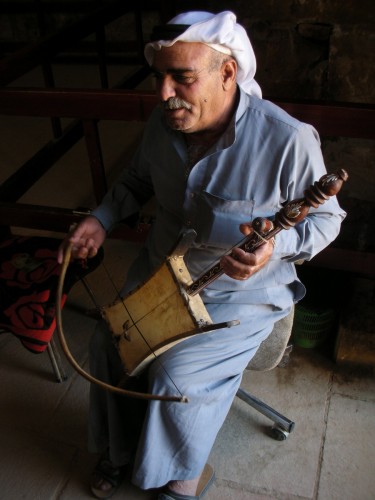
The elderly caretaker of the Umra Palace has a little merry-making of his own with the single-stringed Rababa
We tarried a little bit too much out in the desert, and didn’t get to see quite as much as we wanted back in Amman. At my parents’ request, Mahmoud took them “shopping.” He might have got a little more than he bargained for with me in the car with them though. I frowned at him when he dropped us off in front of a large gift shop on the edge of the city. “Why not take us to the Bel’ad for shopping? More places to choose from.” He protested that the quality was better here, though. I also noticed he seemed to be good buddies with the shop owners, too. Oh well…no one’s perfect. My parents enjoyed it and found a few things to purchase.
The Roman Theatre in the downtown was closed for some reason and we couldn’t get in, and we almost had the same problem at the Citadel Hill as well. Mahmoud asked about us at the gate, and we were immediately rejected, even though I could see families and kids playing around on the hill a few dozen meters away. Mahmoud resignedly started to point out things on the hill from the parking lot, but I went back and tried again. An important-looking man in a business suit spoke to me in both Arabic and English, and when I asked again if we could enter the hill, he quickly agreed to it. Mahmoud tried to walk with us through the entrance, and the suited man curtly told him to go wait in the car. My parents and I both felt that was rather rude and uncalled for. We were able to wander around the site without problems, my parents marveling at the view from the hill that made it such a prime piece of real estate for the Ammonites and early Umayyads to build upon. Unlike last time though, the domed and mysterious Umayyad Palace had its huge doors thrown wide open. I questioned a man and his wife walking through as to why there wasn’t the usual bribe-able guard in place, and he told me that because it was the Eid holiday, they just left the place open and unguarded. Ah, Jordan – sometimes I love how your bureaucratic mind works. Sometimes.
We got to bed moderately early after making some cold ham and turkey sandwiches for the next day’s activities – hiking in the always-spectacular Petra. We left at about 5 in the morning and arrived a good three hours later. My dad sat up with me in the passenger’s seat, filming everything he could and enjoying the Arabic music stations, which I wailingly sang along with whenever something familiar came up (namely, the word “habibi“). This being my third trip to Petra, I obligingly acted as a tour guide for them, rattling off anything and everything I’d ever heard about each one of the sites and tombs we came across. Even after two previous trips here with Haitham et al and Christine, there was always new things I hadn’t noticed before. My Arabic being improved over the course of the six months since my previous visit, I had even more conversing with the Bedouin children and sellers. For example, as the three of us sat next to the Ad-Deir Monastery eating our hard-earned sandwiches after over an hour of heavy stair-climbing, we were approached by a little boy. He looked like he was wearing a karate uniform, but curiously enough, I thought I recognized the logo on the belt that he was wearing. Sure enough, it was a Harley Davidson motorcycle belt, from our very own Milwaukee Wisconsin (or China, take your pick). He developed an immediate love of my cracked sunglasses and when he found that I could speak with him, he told me his name was Ahmad, and he pleaded with me to let him have them as a gift. I warned him that with my sun-weak green eyes, I’d fall off the cliff on the way back without them, and he relented and instead contented himself with the fruits that we offered him from our packs. The apricots are yucky, he told me plaintively. Just like any other 6-year-old boy might, he asked for a dinar so that he could go buy chips and a soda from the Bedouin vendors next to the monastery below.
Everyone was feeling quite tired by the time we made our descent from the monastery’s majestic mountain, and we headed for the exit as the sun crept towards the horizon. On the way back down, my father was engaged again by a Bedouin vendor who pleaded for his custom because she had “Ten Baby” at home. When I talked with her a bit, she actually ended up giving us a few free things and then told me to talk to her son down at the Treasury site’s cafe and get some coffee. The young man we did find there was an enthusiastic man named Faysal that was her nephew instead. He gathered around his fellow employees and they all proceeded to quiz me on Arabic and various political and social aspects of the United States. My head was spinning with all the translation I’d been doing all day, but the three of them seemed satisfied with my answers and waved off the money I proffered for the tea and coffee we had drank – which may have been his aunt’s intention all along.
After leaving Petra behind, we stayed the night at the unique hotel/resort Taybet Zehman, a “hotel” built out of an ancient abandoned stone village perched on the lip of the great bowl that contains Petra at the bottom. Definitely an interesting concept – in our explorations, we confirmed that each room or two was a separate rough-rocked building, just about the size that an average village house might have been a couple hundred years ago. Hot, sandy, and sore from our long hikes of the day, I went down to the pool after sunset to check out the swimming facilities. When I say “went down” I mean it literally in this case; the hotel’s odd construction meant that I actually needed to descend the mountain on a winding path in order to reach the open-air swimming pool. On the way down, I met up with a group of plump Saudis who were staying the night as well, all dressed in the traditional white dishdasha robe. They appeared somewhat appalled at my usage of the pool after sundown. One of them dipped his toe in as I jumped in, and recoiled as if he’d been stung. It was quite cold, but not that bad. I told them I was from Chicago and for the duration of my time there (only about 20 minutes) they commented amongst themselves about how insanely cold it must be in Chicago and how this American must have nerves of steel, or no nerves at all. I was also chorused with “Barack Obama: Very Good!”
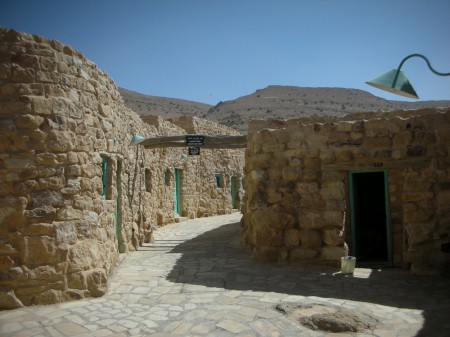
Walking through the stone corridors makes me wonder what it'd be like if they made Machu Picchu into a resort
We continued our journey leisurely the next morning after an excellent breakfast (although slightly cold; perhaps we were a little bit TOO leisurely with our awakening) and met up with my dear friend Suleiman in the early afternoon in Wadi Rum. At my mother’s request, the first thing Suleiman did after loading our bags into his truck was bring us to his cousin’s farm on the edge of Rum Village. He showed off the family’s goats and camels. A large mother camel belched disdainfully at us, then lumbered to her feet at the approach of young baby, a one-year-old who shyly sidled up to her mother and peeked at us with wide-eyes in between bouts of nursing. When the baby was finished and moved off again, Suleiman pulled out an old plastic water bottle and started milking the camel into it. One of the strangest things I’ve ever seen, to watch this tall Bedouin man in full robe and headdress calmly milking a camel into a bottle. He then offered to all of us in turn – provided that we could handle it! Proving that perhaps we were all still a little too tired to be thinking clearly, we all drank from the bottle. Suleiman watched us, obviously impressed, then muttered to me “You know, camel’s milk is for strong stomachs; maybe for someone who has been in Jordan for a long time and is used to the food – are your parents going to be okay?”
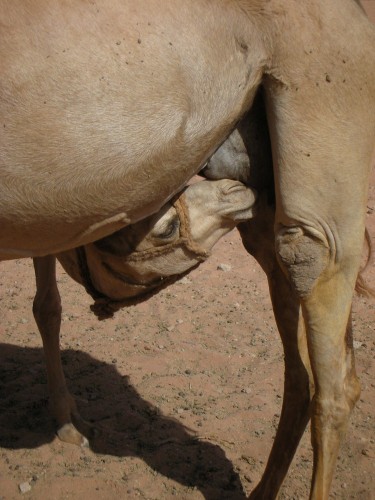
Everyone seemed to be okay; the usual bumpy and bouncy desert ride out to the camp didn’t do anything to upset their stomachs and we arrived without any problems. We had a relaxing evening with Suleiman and his cousin Amar, who I remembered from my first visit to Wadi Rum for Thanksgiving last year. Suleiman seems to get busier and more popular with tourists every time I see him; he couldn’t stay very late and needed to return to the village even before it got completely dark. Dad and I elected to sleep outside under the stars (I personally wouldn’t have it any other way) and I was addled and surprised in the morning to not be covered in morning dew like my previous visits – I guess it was a lot colder the last two times.
Amar was our guide for the day, and he proved to be not only capable in his driving and descriptions, but my parents found him to be simply hilarious as well. He was extremely eager to show off his desert skills, but in a completely laid back, lasseiz-faire sort of way. For example, the first stop of the day was a large rock formation a few kilometers away from the camp that had suffered a unique erosion pattern that caused its bottom to be almost completely worn away, leaving the massive bulk suspended on two miniature pillars, each one less than a meter thick. Amar warned us that it was dangerous to climb up, but then quickly scampered up the side with the sort of flexibility that I think most Westerners lose after the age of 7. He then proceeded to carve a smiley face into the side of the soft sandstone, then patted me on the back and proclaimed, “and that’s you.”
*warning, large high resolution video, 36MB size*
Besides the above dune-jumping (my right leg twinges and my stomach feels as if loaded with curdled camel milk just watching that video), Amar also took us all around the desert to the usual sites, pictures and descriptions of which you can find in previous blog entries (listed on the right side of the page in the floating box), such as the Rock Bridge, Lawrence’s House, and the painted rock cave with ancient Arab paintings that had survived centuries of raging desert blasts by being tucked away into the cliff walls. To my parents’ delight, for lunch he took us out to a massive cliff overhang that provided an excellent shadow at around noon and made us Bedouin tea and a vegetable stew with bread, and then proceeded to discuss politics and religion, allowing my mother to comment that she never thought she’d be talking politics with Bedouins in the middle of the Jordanian desert.
Thoughts of a similar vein were in full force the next morning after spending our second and last night eating zarb-roasted chicken and vegetables and sleeping out under the stars. The three of us awoke early in preparation for our final task before being initiated into the brotherhood (and sisterhood?) of Bedouins: successfully riding a camel from the desert camp back into the village. As we loaded up our bags and packs into Amar’s truck for separate transport back to the village, I heard the low rumbling sound of large heavy toes churning through the sand, and looked up into the distance to see three camels pounding towards us, flickering like ungainly birds between the bright sun and long mountain shadows that fell over their path. Two were being ridden, and a small one was attached by a cord to the second. Amar introduced us to the two camel guides, a Sudani named Tohbeh and a young Bedouin named Sirahmi. Tohbeh, the elder of the two, was quite and politely withdrawn as he loaded us onto the camels, where we hung upon them nervously, clutching the wooden rider horns that rose out of the saddles. I was given the baby boy camel, a 2-year-old named “Tyreh” (which means bird in Arabic), my mother was put upon the mother, “Leyhan,” and dad was given the large, hulking 6 year old father, a beast named “Ayrin.”
The camels bellowed and belched as they lumbered to their feet, unfolding their strange joints like some sort of large furry insect. We hung on tightly at first as Amar waved us goodbye from the truck and took off in front of us, then more loosely as we relaxed and realized the quiet animals weren’t going to suddenly bolt up the side of the mountain and attempt to create the Wild Tourist Rodeo with us. The sun burned hotly to the east, burning our right cheeks. I had asked Mahdi (you may remember him as the guide for Silas and Khalil and myself) attach my keffiyeh in the proper manner over my head so that it would stop falling comically to the ground whenever I walked – I figured it was more important to not have that happened while suspended 3 meters in the air on a camel. The boy, Sirahmi, was about 14 years old and completely full of himself, much like a lot of us are at the age of 14, I believe. He asked me questions every step of the way about America and about my job and what it was like, and asked us all “How are you?” approximately a thousand times. He yelled out that he was going to go to America with Ayrin, “his” camel (Tohbeh rolled his eyes slightly at this) and they were going to be famous in movies. He stopped us about halfway through our trip to take the picture below.
By the end, the trip took a little over 2 and a quarter hours, and besides some sorely-rubbed rear-end tissue from the thick hide and wool saddles, we were all in one piece, wobbling slightly as we dismounted and our legs relearned how to work again. Amar met us at the village gate and transported us by truck back to our car in the tourist parking lot, where we said our goodbyes and I promised him that his talented dune-jumping video would be all over the internet as soon as possible (promise fulfilled, Amar!)
The final stop of our trip after leaving Rum was the Wadi Dhana nature reserve, a massive gash in the mountain range surrounding the Jordan Valley between Palestine and Jordan, about 12 kilometers long from source to the mouth that flows into the valley. The nature reserve, set up the RSCN (Royal Society for the Conservation of Nature) was balanced on the edge of the Wadi canyon itself, and our RSCN-funded lodge looked all the way down the canyon to its end perfectly. We sat on our balconey the sat literally overhanging the Wadi and watched flocks of birds fly through it below us and savored the thought of actually being able to sleep in beds for the first time in 2 days. We were all pretty tired and sore from the camel ride that morning, but we mustered up the energy to do a little bit more hiking by foot around the lip of the Wadi along the Rumman Path, which after the amazing view is spectacularly surrounded by hundreds of small pomegranate trees each bursting (literally) with plump red fruits (“rumman,” by the way, means pomegranate in Arabic). Most had been picked through by locals and other tourists, of course, but being 1.9 meters tall has its advantages and dad and I were able to yank down a nice-looking one from some hidden branches just off the trail.
We ate dinner that night at the Dhana Tower hotel, a laid-back and easygoing hostel situated in the middle of the abandoned Dhana village, which like the Taybet Zeman village had been abandoned for years before enterprising businesses took over it for their own purposes. Unlike Taybet, though, this village was still largely unchanged from its abandonment status. Friendly donkeys roamed the dusty, trash-lined streets and the ancient rock huts were filled with debris, collapsed roofs, and donkey…leavings. The Tower hotel stood near the back of the town and had of course been completely converted to a sort of friendly, homey coziness. We had their buffet dinner, served by young Filipino waitstaff who sternly told us to not stop eating until everything on the buffet line was finished. I did the best I could, of course, but was distracted by a jovial middle-aged Arab man named Ahmad who engaged me in conversation about work and traveling. He did contracting at the nearby cement factory in the next village over (one of the primary reasons for the abandonment of Dhana) and was pleased to converse for my family and I for hours while his friend, an employee at the hostel, banged away skillfully at a little bongo drum and wailed about his darling. Ahmad tried to get me to debka dance a little bit, but I think I’m too out of practice to get into that again!
Still tired the next morning, we decided to take it easy on further hiking, and went further up the same Rumman trail, just enjoying the shade and the verdant growth caused by one of the nearby springs that would eventually flow down and continue the Wadi’s slow, ageless growth. For me, it was particularly exciting; greenery is not exactly something that we have in large amounts in Jordan and I think the last time I saw trees this lush was in the mountains of Tajikistan. It really does go to show that the only thing separating Jordan from looking like South American rainforest is just that – the lack of water. Otherwise, places like Dhana prove that given the opportunity for a little continuous moisture, it could turn easily turn into a new Eden. We sat for awhile by the spring itself, babbling and gurgling through the rough stone channels cut a hundred years ago by farmers to share the precious resource. The spring itself was actually entirely invisible, so dense was the growth of vines, trees, and bushes that had grown out of the rocks around it, but the flow of water that poured from beneath their boughs was cold, clear, and mesmerizing.
Unfortunately, it seemed as if we had missed our chance to hike the main Dhana trail that actually led down into the Wadi. There was almost no shade on the majority of that trail that we could see, and the chief RSCN guide, Abu Yehiyeh confirmed to us that it was best to hike that one before 5 in the morning to avoid the sun and also to see the rare desert ibex that live in the crags of tributary springs flowing into the main canyon. We bid the lodge and the kind Bedouins and guides behind and began the 3 hour return drive to Amman. The dry desert seemed twice as stark to me in comparison to the beautiful valley we had just left, but my dad enjoyed filming the massive sand tornadoes that roared soundlessly through the sand around the highway, spectral ghosts whistling through the dust kilometers away from us.
When we finally returned to Amman, it was Monday night and 5 days had passed. The day’s events were finished yet – my parents got the chance to meet most of my EGT colleagues at the Fakhr al-Din restaurant in Jebel Amman, a beautiful Syrian restaurant that is known throughout the country and region for its spectacular mezze, or appetizers. At Lillie’s expert ordering advice, the 15 of us made a meal out of the mezze alone and spent the night talking about Jordan, our travels, and working. My mother and father loved the food, company, and conversation and were sorry to see the evening end – it was a working night for everyone else, after all! After almost a week of traveling, though, it was good to finally be back in the city and relax. Well, for me at least – I knew that my parents would be up early again the next day and in another tour guide car early the next morning!
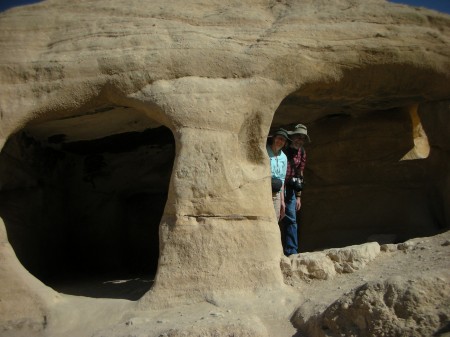
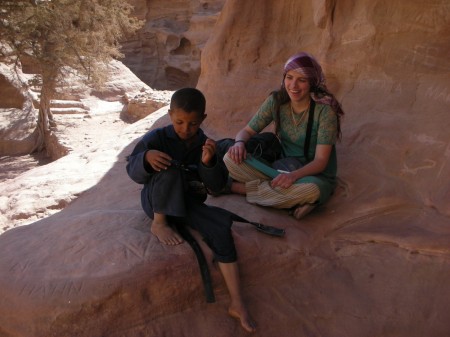
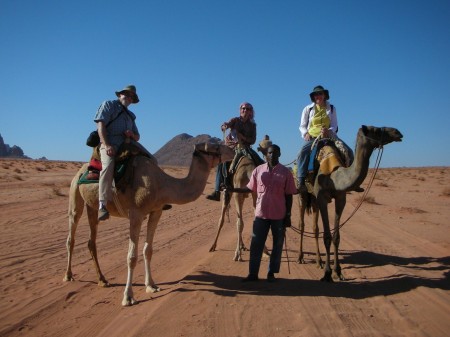
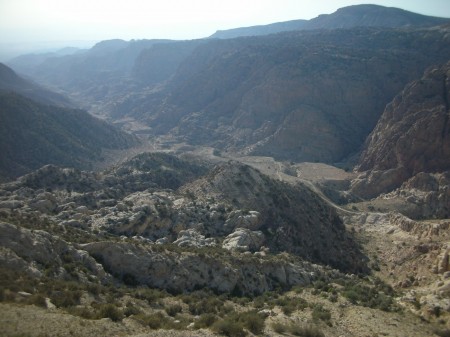
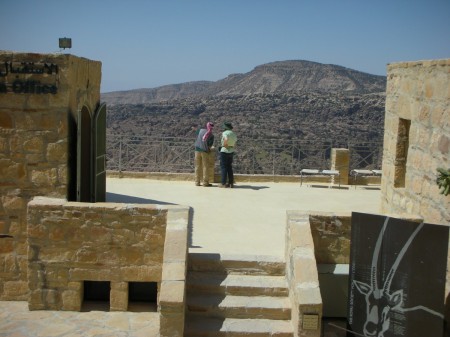


Further kudos to Amar for cooking that lunch over a small fire, and bringing along a rug for us to use as our dining area on the sand!